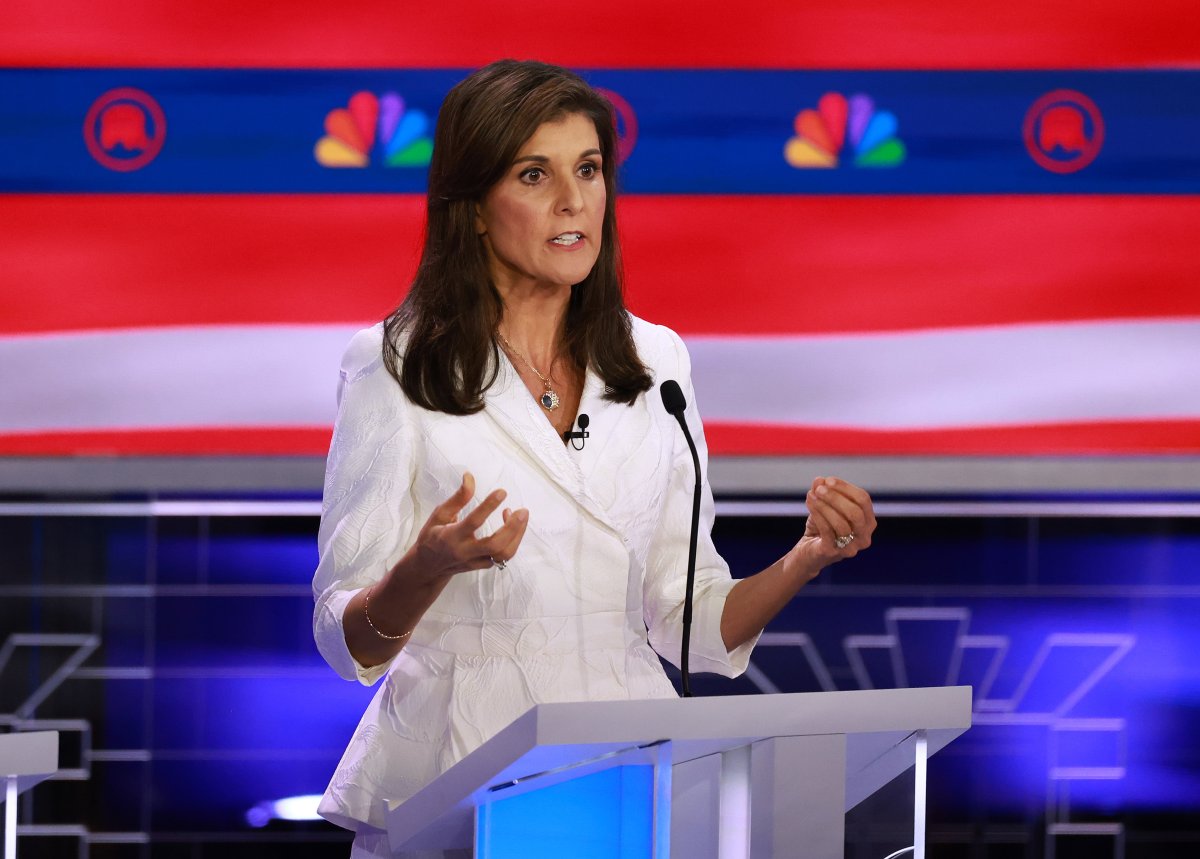Republican presidential candidate Nikki Haley's proposal to make all social media users verify their identities has sparked a backlash online, with some calling it unconstitutional and one legal expert telling Newsweek it is "at the very least, constitutionally dubious."
Haley made the remarks on Fox News in response to the reported rise in antisemitism amid Israel's ongoing war against Hamas in the besieged Gaza Strip.
"Antisemitism was always bubbling underneath the surface, but now we're seeing this massive exaggeration of it, but no one's talking about why," the former United Nations ambassador said.
"The truth is, if you look at social media, the misinformation and the dramatic sides of social media are instigating this. Why? Because it's being pushed by Russia, China, Iran, and North Korea."

Anonymous posts are "a national security threat," Haley said.
"It is why when I get into office, the first thing we have to do, social media accounts... social media companies, they have to show America their algorithms. Let us see why they're pushing what they're pushing. The second thing is every person on social media should be verified by their name," she said.
"When you do that, all of a sudden people have to stand by what they say, and it gets rid of the Russian bots, the Iranian bots, and the Chinese bots. And then you're gonna get some civility when people know their name is next to what they say, and they know their pastor and their family member's gonna see it. It's gonna help our kids and it's gonna help our country."
Haley's proposal prompted criticism on social media, including from rivals in the race for the Republican presidential nomination. Her campaign has been contacted for comment via email.
Florida Governor Ron DeSantis, who is trailing former president Donald Trump in the race for the GOP nomination, called Haley's proposal "dangerous and unconstitutional."
"You know who were anonymous writers back in the day? Alexander Hamilton, John Jay, and James Madison when they wrote the Federalist Papers," DeSantis wrote on X, formerly Twitter.
"They were not 'national security threats,' nor are the many conservative Americans across the country who exercise their Constitutional right to voice their opinions without fear of being harassed or canceled by the school they go to or the company they work for."
You know who were anonymous writers back in the day? Alexander Hamilton, John Jay, and James Madison when they wrote the Federalist Papers.
— Ron DeSantis (@RonDeSantis) November 15, 2023
They were not "national security threats," nor are the many conservative Americans across the country who exercise their Constitutional… https://t.co/YkAGMhUVCX
Christina Pushaw, DeSantis' rapid response director, wrote: "I am no lawyer but isn't this blatantly unconstitutional? Free speech includes anonymous speech."
NEW: Nikki Haley asserts that allowing people to post on social media anonymously is a "national security threat". She promises that as president, she will force "every person on social media" to be "verified by their name."
— Christina Pushaw 🐊 🇺🇸 (@ChristinaPushaw) November 14, 2023
I am no lawyer but isn't this blatantly… pic.twitter.com/MD7CcBZL5r
Vivek Ramaswamy, a biotech entrepreneur who is also in the GOP race, wrote on X that Haley's proposal "is a flagrant violation of the Constitution and straight out of the Democrats' playbook."
He said that "any politician who thinks it's OK for the government to use the private sector as its censorship bureau shouldn't be allowed anywhere near the White House."
.@NikkiHaley is *openly* pushing for the government to use private tech companies to censor speech. This is a flagrant violation of the Constitution and straight out of the Democrats’ playbook. Any politician who thinks it’s OK for the government to use the private sector as its… pic.twitter.com/Cb1847r6CA
— Vivek Ramaswamy (@VivekGRamaswamy) November 14, 2023
Others also noted that the Founding Fathers had written both anonymously and using pseudonyms.
Journalist Glenn Greenwald wrote: "Is Nikki Haley aware that the Federalist Papers were written by founding fathers using pseudonyms? Nikki Haley may be one of the most war-mongering and authoritarian candidates for president in some time. She's completely unhinged. This is blatantly unconstitutional."
Is Nikki Haley aware that the Federalist Papers were written by founding fathers using pseudonyms?
— Glenn Greenwald (@ggreenwald) November 14, 2023
Nikki Haley may be one of the most war-mongering and authoritarian candidates for president in some time. She's completely unhinged. This is blatantly unconstitutional. https://t.co/irQwxsSTrI
Laurence Tribe, a leading scholar of constitutional law and and emeritus professor at the Harvard Law School, told Newsweek that Haley's proposal is "at the very least, constitutionally dubious."
"In very limited circumstances, the First Amendment permits government to require that people reveal their identities when speaking or distributing constitutionally protected material," he said.
"But at least since 1960, when it struck down a California law requiring the distributors of leaflets to disclose their names and addresses in the case of Talley v. California, the Supreme Court has treated anonymity as a constitutionally protected facet of the freedom of speech, so Nikki Haley's proposal is, at the very least, constitutionally dubious and it does seem either ignorant or deliberately misleading for her to make the casual assumption that, because dangerous disinformation has at times threatened national security and public safety, government may enact a sweeping requirement of verified disclosure by name on the part of all who use social media."
Update 11/15/23, 10:30 a.m. ET: This article has been updated to add comment from Laurence Tribe.
Uncommon Knowledge
Newsweek is committed to challenging conventional wisdom and finding connections in the search for common ground.
Newsweek is committed to challenging conventional wisdom and finding connections in the search for common ground.
About the writer
Khaleda Rahman is Newsweek's Senior News Reporter based in London, UK. Her focus is reporting on abortion rights, race, education, ... Read more
To read how Newsweek uses AI as a newsroom tool, Click here.








